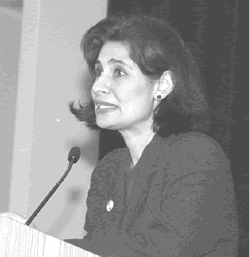Speaker discusses power, Islam
- February 7, 2003
- |
- Emily Vick, Associate News Editor
- Section: News
With the many questions that Americans have about radical Islam, the Academic Speakers Program brought Hali Jilani at 7:30 p.m. on Monday, Feb. 3 in Watkins Auditorium to help set the record straight.
“I find the problem of radical Islam very interesting because of the fact that I don’t see Islam as radical,” Jilani said.
She believes that Americans see the religion as radical because they don't know much about Muslims and their beliefs and cultures. Muslims, according to Jilani, have the same desires and problems as Americans, but their lives are currently being disrupted because of the actions of a few radicals.
The radicals she is referring to are the ones in control who claim that they are doing heinous things in the name of Allah.
Jilani said that no one who believes in any sort of god could perpetrate these crimes. These leaders commit these acts because they are trying to exploit people who have no way to stop them. These leaders include those of Iraq, Pakistan, and Saudi Arabia.
Jilani believes that these nations led by dictators can be helped if a democratic government is put into place. These governments will also be able help to set the tone for the rest of the region. Jilani believes that fixing the problem of leadership in these countries will expedite the problem of ‘radical Islam.’
Iraq was one of the countries Jilani discussed. Jilani said that she understood why people in that country are afraid to stand up to Saddam Hussein because of all of the heinous acts that he has done there. She told the audience about how Hussein has tested many different types of gases on Shiite Muslims.
According to Jilani, he gathers a large group of these Muslims and then buses them out to the desert and then drops different types of gases on them to test the effects. Iraqi citizens are afraid to go against Hussein because they know that they won’t succeed without a plan for a new democratic government in place.
“Although this may seem strange to some people, I am in favor of an invasion of Iraq,” said Jilani. “The thing that I object to is the message of the United States’ administration claim that it is a unilateral position.”
Afghanistan was another nation discussed by Jilani. She contends that the Afghan problem began in 1992 when a U.S.- backed regime came into power and began to oppress women. Jilani said that the U.S. believed that the more radical the element that came into power, the more effective they would be. The problems for women only got worse when the Taliban gained control of the country. They made it even harder for women to leave their houses to go to work and school. The Taliban did one good thing for Afghanistan. They managed to sideline warlords. But because of the fact that there was no plan put in place for a new government after the U.S. bombed Afghanistan, these warlords are beginning to gain back their power after the Taliban fell. Jilani has talked to many people in different areas of the country and she has discovered that the Afghan people want and need a strong, multi-national presence until they are able to stand alone.
During the question and answer session, Jilani was asked whether she thought that Iraq would be able to handle a democratic government if one was put into place. She answered that she definitely believed that Iraq could handle a democracy, as long as they have help until they were able to stand alone. She also said that a democracy in that nation could help set the tone for the rest of the Middle East. This self-described “political doer,” has worked with the US in several capacities, including consultation for the Department of Defense and members of Congress. She has worked with a variety of programs and institutes to help promote better medical care in third world countries, women’s rights, refugees, and the land mine issue. She is also a counterterrorism consultant for the Department of Justice in Washington DC. Currently, she is actively involved in the crisis in the Middle East, and she is working with several of the hot spots in that region.

Academic Programs speaker, Hali Jailani helps UTM student, faculty and staff answer questions and concerns about the Islam nation Monday night, when she spoke in the Watkins Auditorium.